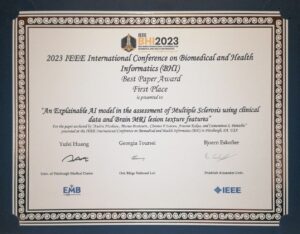IEEE-EMBS BHI 2023: Το Βραβείο Καλύτερης Ερευνητικής Εργασίας απονεμήθηκε στην Άντρια Νικολάου (Υποψήφια Διδάκτορα στο Τμήμα Πληροφορικής του Πανεπιστημίου Κύπρου και Ερευνήτρια στο Κέντρο Αριστείας CYENS)
Το Βραβείο Καλύτερης Ερευνητικής Εργασίας Πρώτης Θέσης απονεμήθηκε στο “An Explainable AI model in the assessment of Multiple Sclerosis using clinical data and Brain MRI lesion texture features” με συγγραφείς τους Άντρια Νικολάου, Μάριος Παντζαρής, Χρίστος Π. Λοΐζου, Αντώνης Κάκας, και Κωνσταντίνος Σ. Παττίχης.
Η ερευνητική εργασία παρουσιάστηκε στο Διεθνές Συνέδριο IEEE Biomedical and Health Informatics (BHI) στο Pittsburgh, PA, USA, 15-18 Οκτωβρίου 2023.
Η ερευνητική εργασία παρουσιάστηκε από την Άντρια Νικολάου, Υποψήφια Διδάκτορα στο Τμήμα Πληροφορικής του Πανεπιστημίου Κύπρου και Ερευνήτρια στο Κέντρο Αριστείας CYENS. Το IEEE-EMBS BHI χορηγείται από την IEEE Engineering in Medicine and Biology Society (IEEE EMBS) και είναι το κύριο τεχνικό συνέδριο του EMBS για την Πληροφορική και τις Επιστήμες Υγείας.
Το θέμα του συνεδρίου ήταν ο μετασχηματισμός στη φροντίδα υγείας και στη βιοϊατρική με χρήση τεχνητής νοημοσύνης. Το συνέδριο προσέλκυσε περισσότερους από 300 συμμετέχοντες και το ποσοστό αποδοχής ερευνητικής εργασίας για προφορική παρουσίαση ήταν 12%.
Περίληψη ερευνητικής εργασίας – Abstract:
Magnetic resonance imaging (MRI) is an essential visualizing tool in the diagnosis and monitoring of Multiple Sclerosis (MS) disease. However, the neurological examinations and the MRI assessments are insufficient to provide personalized treatment to the patients due to the complexity of the disease. This study implemented an explainable artificial intelligence (AI) model with embedded rules to assess MS disease evolution. Clinical data were used including demographic and neurological measurements. Texture features were extracted from manually delineated and normalized brain MRI lesions. Statistical analysis was employed to select the statistically significant texture features and clinical data. Different models using machine learning algorithms were implemented to differentiate the subjects diagnosed with relapsing-remitting MS (RRMS) from the subjects with progressive MS (PMS). Argumentation-based reasoning was performed by modifying the rules extracted from models with the best evaluation results. The findings indicated that the proposed explainable AI model can predict the clinical conditions of MS disease with high accuracy and provide transparent and understandable explanations with high fidelity. Future work will include further clinical data such as medications, and investigate the correlation of the texture features and clinical data with the neurological impairment. The proposed model should also be evaluated on more MS subjects.















